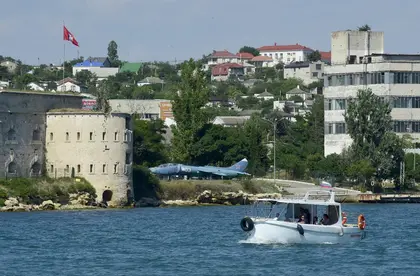Russians still have access to their choice of familiar resorts – the Black Sea coast of the Caucasus, the Azov Sea, including part of the occupied territory of Ukraine, and even the Georgian coast with its luxurious beaches. And yet many Russians stubbornly head to Crimea for their holiday, encouraged by the Russian government’s statements about recent improvements to the peninsula’s resort infrastructure.
Russia’s second-largest budget allocation, after military expenditure, is propaganda. Apparently, it was propaganda-budget money that paid for the purchase of ten ocean sharks from Singapore.
JOIN US ON TELEGRAM
Follow our coverage of the war on the @Kyivpost_official.
The sharks, destined to entertain holidaymakers in Crimea, are currently resting in St. Petersburg before their 2,000-kilometer road journey south, in special tanks filled with “ocean” water.
The journey will be stressful for sharks and drivers alike. To reach the peninsula they will have to drive across the bridge built by the Russians between 2016 and 2019 which joins Russia to Crimea.
Ukrainian military intelligence has promised to destroy the bridge by the end of this summer, and the Russian authorities regularly close it to traffic and impose ever more strict rules for bridge users when it is open.
Security guards do random checks on cars, forcing drivers and passengers out of their vehicles and going through every piece of luggage. The cars themselves are also checked very carefully by X-ray machines. Sometimes, there is a line of 1,500 cars waiting to cross the bridge.

‘I Only Know South Korea Has Fewer Mountains’ – Testimony From Captured Pyongyang POW
While Russians traveling to Crimea may be able to prepare themselves mentally for the long wait at the bridge, they probably can’t prepare themselves for the risk of being killed or wounded during their vacation.
The many Russian military facilities in Crimea – often located near beaches – are legitimate targets for Ukrainian missiles and drones. Russian air defense often tries to shoot them down right over the beaches where vacationers are relaxing.
Recently, about 150 Russian holidaymakers were injured and four people, including two children, were killed when a Ukrainian missile was brought down over a beach in Sevastopol. Among the injured was the family of a high-ranking Russian official from Magadan, Oleg Averyanov.
Why did he and his family travel 11,000 kilometers from home to vacation in Crimea when residents of Russia’s Far East usually prefer to take their holidays in China, at seaside resorts specially built for them? North Korea will also soon complete a resort city for Russians.
The thing is, the Russian government regularly reminds its officials that vacationing in Russia is a patriotic gesture that strengthens the trust between the authorities and the people. Going on holiday in annexed Crimea is doubly patriotic because it requires courage and it can earn officials “Brownie Points” with the Kremlin.
Crimea is also used by the Kremlin as a territory for “soft” punishment of disloyal cultural and artistic figures who want to atone for their anti-war statements or attempts to escape from mobilization abroad. These malefactors are requested to perform at Crimean concert venues, or for military units, and injured soldiers in hospitals on the peninsular.
Ukrainians have been thinking more about the peninsular recently since the release, in a prisoner exchange, of Nariman Dzhelal. He is the deputy chairman of the banned Crimean Tatar Parliament and was convicted of trumped-up charges and sentenced to 17 years in prison in September 2022.
Immediately after his release, Dzhelal’s wife, Leviza, and their four children left Crimea and the family was reunited in Kyiv. They have no way back. Dzhelal cannot return to Crimea until it is liberated.
They might be able to sell their home in Crimea, but it is also possible that the Russian authorities will decide to “nationalize” it, just as they nationalized the home of the Ukrainian Crimean Tatar singer Jamala, who won the Eurovision Song Contest in 2016. She was convicted in absentia of “spreading fake news about the Russian army” and put on the wanted list.
Jamala herself has been living in Kyiv for several years and she has removed her parents from annexed Crimea.
“Now they are rummaging through my father’s things,” Jamala wrote in an anguished post on Facebook.
“Nationalization” and confiscation of the property of Crimeans disloyal to the Russian government began in 2014 and the process continues.
It happened recently to a villa belonging to the famous Soviet singer Sofia Rotaru – now a citizen of Ukraine – who has spoken out against the Russian aggression.
The new oceanarium, to which the Singapore sharks will be transported from St. Petersburg, will be built somewhere near Rotaru’s villa in Yalta. Perhaps the villa will even be made part of the future oceanarium complex.
Another planned tourist attraction is a crocodile park in Feodosia.
However, despite all these efforts, I imagine local authorities will have trouble attracting holidaymakers to the peninsula.
The violent scenes on a Sevastopol beach caused an unexpected wave of criticism from residents against the city authorities who had previously resisted building bomb shelters in the city.
The construction of 600 of them across the city has now been given the go-ahead.
No doubt, once in place, these concrete shelters will serve to remind residents and visitors to Sevastopol that they are in a war zone, and not in a safe Black Sea holiday resort.
The views expressed in this opinion article are the author’s and not necessarily those of Kyiv Post.
You can also highlight the text and press Ctrl + Enter










